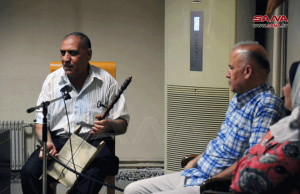Damascus-SANA
On the 48th anniversary of the liberation of Quneitra from the Zionist occupation and the raising of the flag of the Syrian Arab Republic by the founding leader Hafez al-Assad in 1974, the Arab Cultural Center in the Al-Adawi neighborhood in Damascus hosted a cultural evening entitled “Tangible and Intangible Heritage in the Occupied Golan.”
The evening was attended by Dr. Ammar Al-Nahar, head of the history department at Damascus University, Dr. Khaled Al-Fayyad, researcher in heritage affairs, Ahmed Al-Hassan, researcher in Golan affairs, and poet Khaled Sweid.
At the beginning of the evening, a documentary film was shown about the orientalists who documented the Julani heritage. Dr. Al-Nahar explained that heritage has extended roots and forms the fabric of a cohesive and homogeneous society, pointing out that one of the most prominent aspects of the conflict with the Zionist entity is the heritage front, as the occupying entity tries repeatedly to forge heritage and attribute it to it.
The researcher Ahmed Al-Hassan defined the Julani heritage song as a song attached to the people, simple in its emotions, as it relies in itself, vocabulary and rhythm on an old folk melody and is characterized by its colloquial “bedouin or peasant” dialect, indicating that it is a mixture of the environments of the Julani society and its songs are characterized by the accuracy of their melodies and wonderful melodies.
And he indicated that this tenderness is observed in performance, melody and rhythm. The popular singer is sensitive to hearing and masters spontaneous folk melodies, as he has good taste and a delicate ear that distinguishes the right rhythm.
Al-Hassan pointed out that the popular song is the popular newspaper that expresses absolutely spontaneously and sincerely the emotional charge of Ibn al-Golan in his solution and travels and organizes it depending on his intuition and spontaneity. It expresses the environment of the Golan and has many implications such as sadness, joy, hate and passion.
As for Fayyad, he spoke in the evening about the distinctive customs of our people in the occupied Golan and the etiquette of hospitality.
The Swedish poet participated in patriotic poems of vertical poetry that sang in the Golan and on the occasion of raising the Syrian flag in the sky of Quneitra. The poet Ajaj Nayef Hammad also recited folk poems from the Golan heritage accompanied by the Rababa instrument.
Hadi Imran
Follow Sana's news on Telegram https://t.me/SyrianArabNewsAgency

